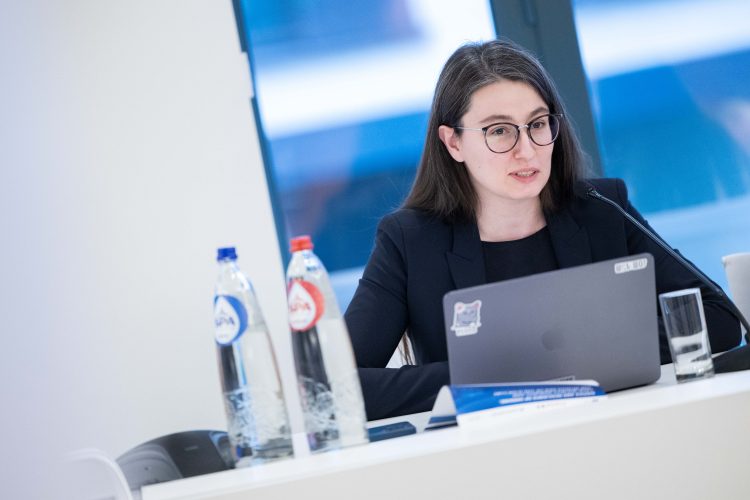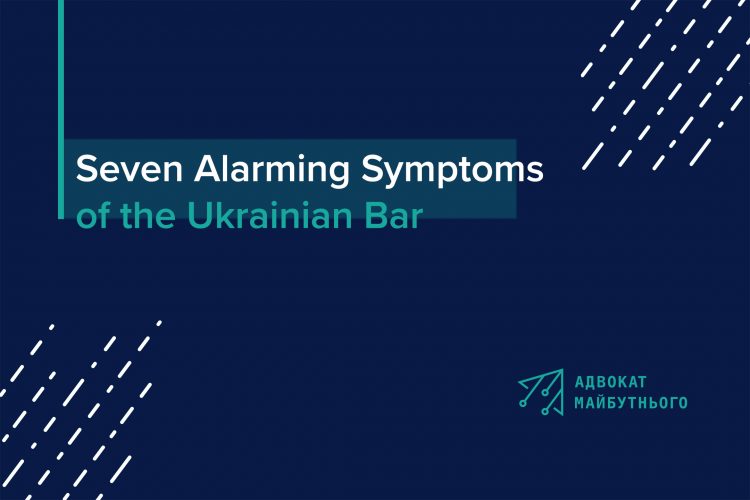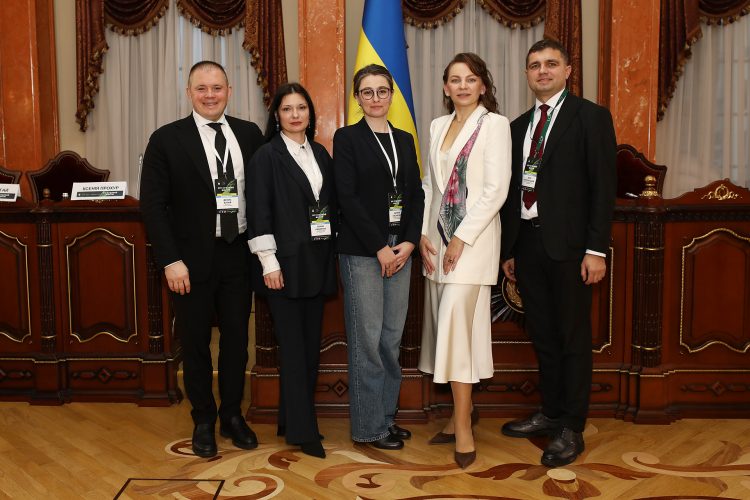
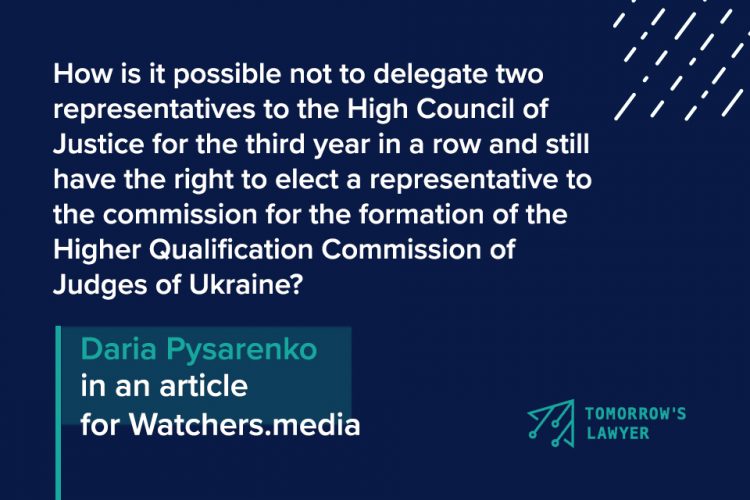
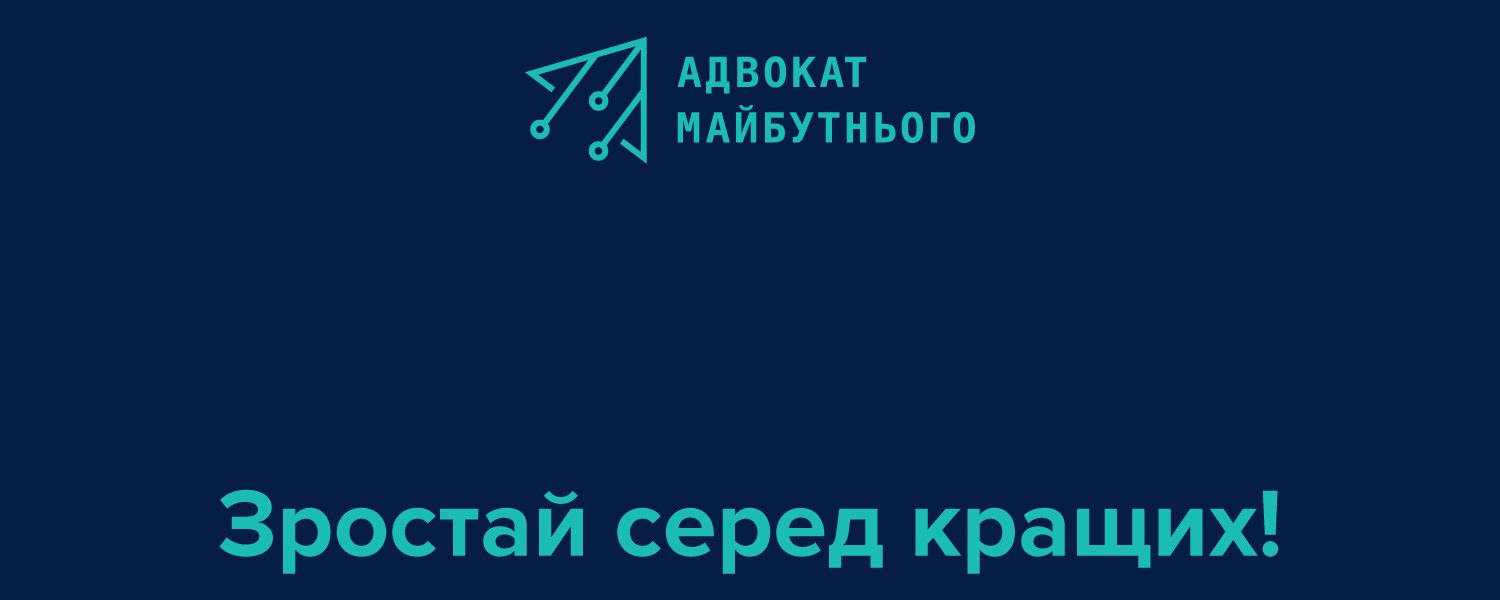
How is it possible not to delegate two representatives to the HCJ for the third year in a row and still have the right to elect a representative to the commission for the formation of the High Qualification Commission of Judges?
Daria Pysarenko, Director of Tomorrow`s Lawyer
specially for Watchers.media
You can’t have your cake and eat it
Today, August 12, we got to know the three candidates from the Bar Association for the commission that will form the High Qualification Commission of Judges. For the third year in a row, the Ukrainian Bar Association has failed to fulfill its constitutional duty to delegate representatives to the High Council of Justice. Despite this, the Bar Council of Ukraine has received and is exercising another key power: forming a commission to select members of the High Qualification Commission of Judges. In this article, I will try to analyze how such selectivity became possible and what are the legal, ethical, and institutional consequences of this paradox. We will question the legitimacy of this arrangement, assess the potential threats to trust in judicial reform, and see whether this creates a convenient “blind spot” for the self-governance of the bar.
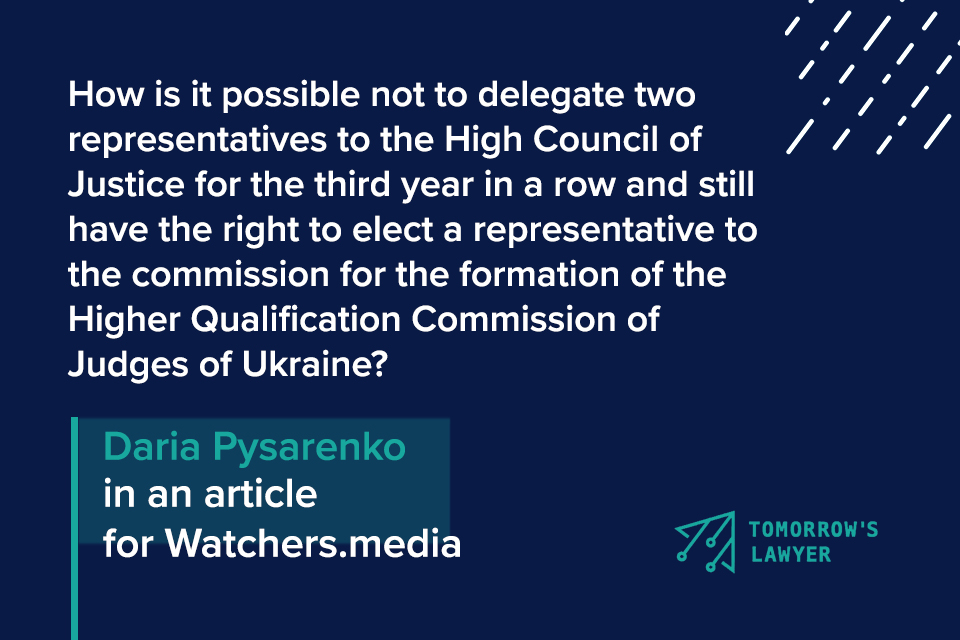 The High Council of Justice (HCJ) should consist of 21 members, but currently only 15 members are in office. Two representatives of the Bar, two representatives of the President, and two representatives of the judicial self-government are missing. As we can see, the Bar is not the only one missing. This not only undermines the principle of representativeness, but also seriously distorts the mechanism of collegial decision-making, which is the cornerstone of the HCJ’s activities. According to the law, the High Council of Justice can only consider the appointment of judges if at least 14 of its members are present at the meeting. The same number of votes—14—is required to adopt a decision to submit a proposal to the President of Ukraine regarding the appointment of a judge.
The High Council of Justice (HCJ) should consist of 21 members, but currently only 15 members are in office. Two representatives of the Bar, two representatives of the President, and two representatives of the judicial self-government are missing. As we can see, the Bar is not the only one missing. This not only undermines the principle of representativeness, but also seriously distorts the mechanism of collegial decision-making, which is the cornerstone of the HCJ’s activities. According to the law, the High Council of Justice can only consider the appointment of judges if at least 14 of its members are present at the meeting. The same number of votes—14—is required to adopt a decision to submit a proposal to the President of Ukraine regarding the appointment of a judge.
What does this mean in practice? With a full complement of 21 members, such a decision is adopted by a qualified majority of 66.6% of the votes. However, with the current complement of 15 members, 93% of the votes are required, which is effectively unanimity. This creates an extremely vulnerable situation: one or two abstentions can completely block personnel decisions in the judicial system. Collegiality, which should ensure balance and professional discussion, is de facto transformed into dependence on the positions of individuals.
At the same time, the Bar is not represented at all – there is no voice that would reflect its position or assess the situation through the prism of the legal profession and influence decision-making concerning the protection of its interests, in particular in matters related to disciplinary complaints or procedural guarantees. Instead of an institutional balance between judges, the Bar, academics, the prosecution, and other representatives of the justice system, we have a skew that creates risks for every single decision made by the High Council of Justice.
Three years ago, the Congress of Advocates of Ukraine could have fulfilled its constitutional duty and thus ensured representation of the Bar in the High Council of Justice, and consequently, influence on the formation of the judicial system. However, this did not happen. The bodies of the bar self-government insist on the so-called principle of “continuity” of the bodies of the bar self-government, so the congress is not convened, and the initiatives of the regions to convene it are ignored.
This has led to the majority of central and regional bodies of the bar self-government actually working for more than 13 years, instead of the maximum allowed 10 (two terms of 5 years). A smaller part has been working for more than 8 years, despite the 5-year term provided for by law for the first term. We at Lawyer of the Future analyzed this state of affairs in the Shadow Report under section 23, “Justice and Fundamental Rights,” in the European Commission’s 2023 report on Ukraine and in the column “Reform of the Bar: Why Judicial Reform Will Never Be Complete Without It.”
The Bar Council of Ukraine gets the right to delegate a representative to the commission for the formation of the High Qualification Commission of Judges
Against this backdrop, it seems particularly ironic and disturbing that, despite failing to fulfill its constitutional duty to the judicial self-government (the BCU did not convene a congress), the Bar Council of Ukraine obtained the right to delegate its representative to the commission that will form the High Qualification Commission of Judges and is actively exercising this power.
You can’t have your cake and eat it too, as the English say. But in the Ukrainian reality of the Bar, it seems that you can – and not delegate, and delegate at the same time.
Against the backdrop of systematic calls to begin the process of forming the commission and already active steps to delegate, it was surprising to hear the proposal of the Head of the BCU, UNBA at a round table on July 8, to return to the model of direct, immediate formation of the High Qualification Commission of Judges by bar associations, prosecutors, and judges – “the Council of Judges and the Council of Prosecutors directly appoint their representatives, and that’s it. Because it takes a long time to convene a congress. It’s a simple and quick way.” The Chair of the NAUA and the RAU also proposed to provide for “a mechanism for recalling [delegated members – author] if someone fails to perform their duties.” I would like to remind you that until 2016, the RBA, the RSU, and other bodies directly delegated members to the High Qualification Commission of Judges. For example, in 2015, the Congress of Advocates delegated Pavlo Lutsiuk to the High Qualification Commission of Judges, whom the lawyers themselves recalled in 2019.
This contrast clearly highlights the selectivity in institutional activity. It also demonstrates the asymmetry of the legislative approach: the HCJ is formed through representatives of congresses—the highest bodies of communities, which ensures legitimacy and independence. In contrast, the High Qualification Commission of Judges is formed by councils – i.e., executive structures that do not have a broad representative base.
This is not just irony. It is an asymmetry of legitimacy – where the constitutional function is artificially paralyzed, while current personnel participation is active and centralized and allows influence to be exerted on the judicial system. This situation casts a shadow not only on the effectiveness of the bar’s self-government, but also on the perception of selectivity in institutional behavior. It also raises entirely legitimate questions for the legislators who designed this structure.
How was the commission formed until June 2025?
Let me remind you that until June 2025, the competition commission for the selection of the High Qualification Commission of Judges was formed by judges delegated by the Council of Judges of Ukraine, as well as international experts proposed by Ukraine’s partners. In accordance with the Law, their powers expired on June 1, 2025, and the parliament did not extend them, although a draft has been available on the parliament’s website since June 18. As a result, a new model for forming the competition commission came into force: now its candidates are nominated by four institutions:
the Council of Judges of Ukraine – at least 6 candidates,
the Council of Prosecutors of Ukraine – at least 2 candidates,
the Bar Council of Ukraine – at least 2 candidates,
the National Academy of Legal Sciences of Ukraine – at least 2 candidates.
From the proposed candidates, the High Council of Justice must select six members of the new competition commission:
three representatives from judges,
one from lawyers,
one from prosecutors,
and one from the National Academy of Legal Sciences of Ukraine.
European Commission spokesperson Guillaume Mercier said at a briefing on July 30 in Brussels that the EU expects the renewal of international experts in the selection committee for the High Qualification Commission of Judges. However, the deadline for submitting candidates from entities expires on August 12. The procedure has already begun. The next step is to consider the candidates of the High Council of Justice. In view of this, it will be extremely difficult to change the composition of the commission or revise the approach at this stage without violating the established procedure. However, legislative levers can still be used.
Is the Bar ready to participate in the formation of a judicial governance body?
In the context of discussing a new model for forming the competition commission, it is worth referring to the conclusion of the Venice Commission from 2020 regarding the law that provided for the participation of international experts in the selection of the High Qualification Commission of Judges:
“The Venice Commission welcomes the fact that the composition of the Competition Commission is based on the previous conclusions of the Venice Commission, in particular regarding the participation of international experts.”
At the same time, “The Venice Commission reiterates that such bodies should be established exclusively during the transitional period until the planned results are achieved. A permanent system could raise questions of constitutional sovereignty.” This caveat seems entirely logical and reasonable, especially in the context of the development of national institutions. In the long term, a fully national mechanism is the right and necessary goal to strive for. However, the question arises: has the Ukrainian justice system, in particular the Bar, really achieved the “planned results” that would allow a return to a fully national mechanism?
The reform of the judiciary and the prosecution service is moving forward – with difficulties, but gradually. At the same time, no changes are observed in the Bar Association. Moreover, the state itself recognizes deep problems in its functioning. This is recorded in two key documents:
– Roadmap for Reforms on the Way to the EU, approved by the Cabinet of Ministers;
– The Strategy for the Development of the Justice System, currently being developed by the Office of the President.
Both documents contain separate provisions on the need for a fundamental overhaul of the Bar. The reason for this is its long-standing negative impact on the quality of justice and the lack of reforms over many years.
No less important is the issue of the legitimacy of the Bar Council of Ukraine. According to the law, its powers expired in 2022. Therefore, the acceptance of delegates from the UBA to the competition commission will not only lead to its de facto legitimisation by state bodies, but also to the legitimisation of the practice of ignoring the Congress as the highest body of bar self-government. This sets a dangerous precedent. A clear distinction must be made: decision-making within the framework of bar self-government is an internal matter; participation in the formation of judicial bodies is a matter of public interest and public trust.
***
On 22 July, the High Council of Justice announced the start of a competition to fill vacant positions on the Competition Commission – in effect, the formation of the High Qualification Commission of Judges itself.
On 25 July, the selection methodology was published, which includes: a list of documents to be submitted by candidates; the criteria they must meet; the selection procedure, including open interviews, which the High Council of Justice will broadcast online and publish on its website.
HQC and Bar Council criteria: what is the difference?
On the same day, 25 July, the Bar Council of Ukraine announced the start of accepting documents from lawyers wishing to join this commission. However, its decision does not contain either selection methods or clearly defined criteria. The document sets out the legal basis for the competition, organisational aspects (including deadlines) and requirements for additional documents to be submitted by candidates, in addition to the requirements established by the HQC.
For example, the HQC requests copies of documents confirming professional experience in the field of law. Documents confirming professional experience in the field of law may include an employment record book, a list of positions held, job descriptions or other documents relating to the person’s relevant activities. According to established practice for participation in competitions for lawyers, such documents include contracts, orders, court decisions, powers of attorney, etc.
However, the BCU clarifies – and in fact narrows – this requirement: it insists on the submission of “a certificate from the Secretariat of the UNBA, the Bar Council of Ukraine on the number of orders issued by the candidate for the period from 2024 to 2025, confirming that the candidate has provided legal aid in courts and other bodies” and the availability of ‘a certificate from the authorised body confirming that the candidate was assigned by the Legal Aid Centre to provide free legal aid for the period from 2024 to 2025.’
- This raises at least one question: why only for the period 2024-2025? For example, if a lawyer was in military service during this time but meets all the key criteria of the VRP methodology – impeccable business reputation, high professional level, public authority – he will obviously not be able to provide such documents. But does this mean that their previous experience, say, decades before that, is not taken into account? In that case, can this competition be called inclusive and taking into account the realities of war, in particular the participation of lawyers in the defence of the state? Obviously not. This requirement is discriminatory. Such a condition does not take into account equal access to participation in the selection procedure and contradicts the principle of equal opportunities in a public competition.
- Why is an order issued by the Bar Council proof of activity? For example, under Article 50 of the Code of Criminal Procedure, a lawyer can confirm their powers by a contract with a client. There is even a separate decision of the Supreme Court on this. On the other hand, any lawyer who pays contributions can generate an order and not use it. Instead, the UNBA does not request actual confirmation of legal services, such as court decisions or contracts, as is traditionally required of lawyers in competitions for judicial positions. The UBA’s emphasis on the requirement for completed orders, without requiring their implementation, creates a risk of formal filtering, which does not necessarily correlate with actual professional competence. This reduces the transparency and fairness of the selection process, replacing qualitative assessment with a quantitative indicator. Or, for example, a lawyer has a dozen large cases that began long before 2024 and has proof of their activity, but did not start any new cases in 2024-2025 and therefore did not receive any orders? Such a time limit not only violates the principle of equal access for all lawyers, but also contradicts the requirement of representativeness of professional experience. Legal practice is the result of long-term experience, which cannot be adequately assessed based on the last two years alone. The establishment of an exclusive two-year (and in fact one-and-a-half-year) period without a clearly defined need appears to be a disproportionate and discriminatory measure that is not based on objective and transparent selection criteria.
- The fact that this certificate is issued by the UNBA can also be seen as a form of centralised control, where access to the competition may indirectly depend on the body that is itself involved in the selection process. This approach may create a conflict of interest or, at the very least, raise doubts about objectivity.
The following difference regarding documentary evidence of disciplinary offences in the wording of the HCJ methodology and the requirements for documents in the BCU decision is also surprising:
(1) the HCJ criteria include the clause ‘has not committed disciplinary offences or unethical conduct established by authorised state authorities’;
(2) The Bar Council’s decision requires “a certificate from the Secretariat of the Ukrainian National Bar Association, the Bar Council of Ukraine on the presence/absence in the Unified Register of Lawyers of Ukraine of information on the candidate’s disciplinary liability for the period from 2012 to 2025.
As we can see, these rules differ significantly in terms of content and legal consequences. Let us conduct a comparative legal analysis:
The decision of the High Council of Justice refers to the fact that a disciplinary offence or unethical conduct was established by the authorised body. The consequences are based on the confirmed fact of the offence, not simply on information about proceedings or a decision that could have been overturned by a court. Therefore, this requirement is considered to have been met, even if disciplinary action was taken at some point but was subsequently overturned.
The BCU decision does not refer to the established fact of guilt, but to the mere fact of the existence of an entry in the register. Formally, it may be the case that the decision has been overturned, but the record of the proceedings remains in the database. In such a case, a legal conflict may arise: according to the HCJ criteria, the candidate was not subject to disciplinary liability. However, in the initial competition, the candidate may not pass the formal filter due to the existence of the record. On the other hand, the Bar Council may clarify the requirement and provide additional explanations. This is particularly problematic given that the bar self-government bodies themselves are active applicants in disciplinary cases against lawyers. In the last year alone, the Higher School of Advocacy (founded by the Ukrainian National Bar Association) has filed hundreds, and according to some estimates, thousands of complaints. With this approach, even the absence of a final decision can effectively block a lawyer’s participation in the competition solely because of a technical entry in the register.
A comparison of the requirements of the High Council of Justice and the Bar Council shows that there is no uniform standard, which creates legal uncertainty and may lead to subjective or selective decisions. Competition procedures should be harmonised and contain clearly defined, reasonable and non-discriminatory criteria that are applied equally by all selection bodies.
What is the selection procedure?
Unlike the announcement of the High Council of Justice, the decision of the Bar Council of Ukraine does not currently contain any selection methodology, evaluation criteria or detailed procedure.
The document is limited to setting out the legal grounds for holding the competition, organisational aspects (in particular, deadlines for submission) and a list of additional documents that candidates must provide, in addition to those required by the decision of the High Council of Justice.
The lack of clearly defined approaches contradicts the principle of legal certainty, deprives candidates of predictability and does not provide a clear understanding of the conditions under which the selection will be made. This, in turn, creates risks of biased or non-transparent decisions, reduces trust in the results of the competition and opens the door to extra-procedural influence.
In this context, it is hoped that the Bar Council will publish the selection methodology and clear evaluation criteria and ensure that the competition is conducted in accordance with the principles of openness, in particular through public interviews, video broadcasting and publication of video recordings of meetings – both during the consideration of candidates and during the decision-making process on the selection of two delegates, from among whom the High Council of Justice will subsequently select one representative to the High Qualification Commission of Judges selection committee. Actually, at least after the selection. These are the standards that have long been observed in various formats by judicial (self-)governance bodies and which the Bar should strive to achieve. I would not have believed myself in 2012 that I would one day write this sentence above.
Against the backdrop of the formation of the commission with the participation of the Bar Council of Ukraine, one cannot fail to note the decision of the Bar Council No. 72 of 7 June on initiating disciplinary proceedings against two current members of the High Qualification Commission of Judges. However, this is already a story for the next article.
